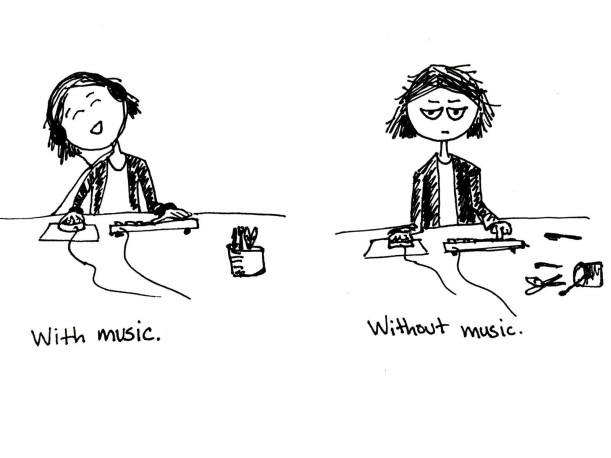 Music in the Workplace
Music in the Workplace
If you ask people why they listen to music, you might get answers like: “It helps me escape my current situation,” “It makes me happy,” “I feel more energized or productive,” etc. With responses like that, it’s not surprising that most people listen to music while they clean the house, exercise or sleep. But how many of us listen to tunes while we’re working? I don’t mean on the radio; I mean music from our own playlists with headphones to cover outside noise.
At my first journalism job out of college, I worked as a copy editor at a local newspaper. My boss recommended I bring my iPod and headphones to work every day. I was baffled. Had I heard him correctly? Did he seriously recommend I bring in a device of distraction that was normally restricted in the classroom and looked down upon in public?
It was his belief that music stimulates the brain. And he’s not wrong.
I was thrilled to have a leader who allowed me the concentration I didn’t realize I would need while working in a room full of people. The typical atmosphere of a newsroom involves people talking on the phone, asking each other editing questions, cracking jokes, turning up breaking news stories on TV, listening to the crackling static of the police scanner, etc. Since that job, I have shared this information with all of my bosses. Most leaders agree with my first boss and also allow their employees to listen to music for focusing purposes.
Music doesn’t just enhance concentration, it also brings out creativity, and with a career in writing, music devices are important to income!
There are many other benefits to listening to music.
 Music Go-Tos
Music Go-Tos
Now that you know music helps productivity, let’s discuss what types of music work for certain situations. For example, if you are editing, lyrical pieces might be more disruptive than helpful. When editing or writing technical pieces, my go-to music is strictly instrumental. It is still inspirational, but not cluttered with words.
Film scores are energizing and boost my creative wild side. One of my favorite pieces is the Alice in Wonderland theme song by Danny Elfman (from the Tim Burton movie). It does have lyrics, so I tend to avoid it when I’m editing, but purposely play it (sometimes on repeat) for writing assignments. I’m actually listening to it as I write this! 🙂 Some of my other favorites are Batman: The Dark Knight Rises, Slumdog Millionaire, The Lion King on Broadway and Across the Universe.
I also like listening to powerful classical pieces or theater musicals, such as Les Miserables or Phantom of the Opera, for meeting deadlines. I get type-happy and punch my computer keys in a stream of consciousness-style until I run out of ideas when these songs play. Even if the writing starts out subpar at first, I can switch to instrumental-only later for editing.
When I’m writing fiction, I listen to different genres of music depending on the type of story I’m writing. Naturally, darker stories tend to draw me to listen to dark music, such as heavy metal or modern rock; lighter stories require folk or oldies; action stories need classic rock or film scores; thought-provoking, literary stories push me in the direction of concept albums like Pink Floyd’s The Wall.
For those of you who don’t find music helpful at work, but are interested in trying sound-related motivators for other reasons, visit Soundrown. It is a website where you can find white noises: blowing fans, rainstorms, rushing water, TV static, nature sounds, etc. There are also handy phone apps, such as the iPhone’s Sleep Pillow app for sounds and combinations you can create to make your environment as comforting and creative as you need. There are many other great options for free music like Pandora, Spotify (my personal favorite, even though it makes my computer slow) or SoundCloud.
Genre and Personality
While headphones are great for jobs that require concentration, not all of us have the luxury of working in an office setting. Some of us work in factories, build houses, educate children, buss tables, etc. So how can you listen to music in a classroom setting or at a machine? And if you find time to listen, what do you listen to?
Obviously I do not recommend dangling headphone cords around a machine for the sake of drowning out background noise, nor do I think teachers should plug their ear holes and ignore a classroom full of children to get a little peace and quiet. But there is always the option of listening to music during breaks, whether you leave your work site or not. Utilize music to get you motivated for the next part of your shift.
A perk to not working in an office setting is you can listen to any type of music that fits your personality — lyrics or not. Studies show that your favorite genre of music is based off your personality. Does your personality match your favorite music genre?
What music do you listen to at work?
















 Is your office as cold as mine? Consider always having a dressy sweater or cardigan on your chair or in a desk drawer so you have something every day to thaw your frozen limbs. If you’re lucky, your boss will store blankets in a closet!
Is your office as cold as mine? Consider always having a dressy sweater or cardigan on your chair or in a desk drawer so you have something every day to thaw your frozen limbs. If you’re lucky, your boss will store blankets in a closet! atisfy Oral Fixations: Admit it, oral fixations are not just for smokers. We all crave something to drink or nibble on while we’re working at our desks. Don’t be afraid to take mini breaks to refill your water bottle or coffee/tea mug. Also, provide portioned snacks to nibble on during your shift.
atisfy Oral Fixations: Admit it, oral fixations are not just for smokers. We all crave something to drink or nibble on while we’re working at our desks. Don’t be afraid to take mini breaks to refill your water bottle or coffee/tea mug. Also, provide portioned snacks to nibble on during your shift.